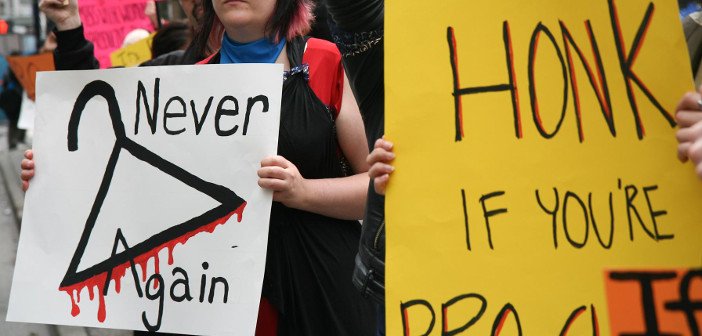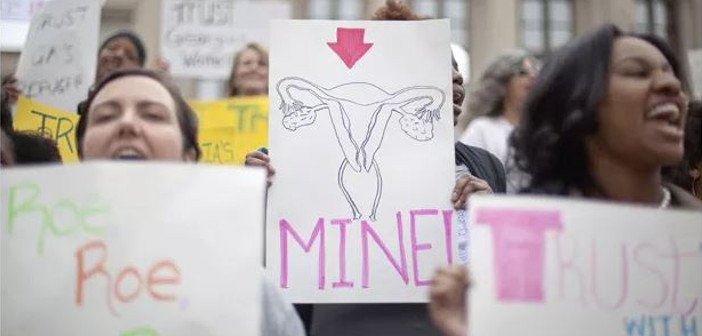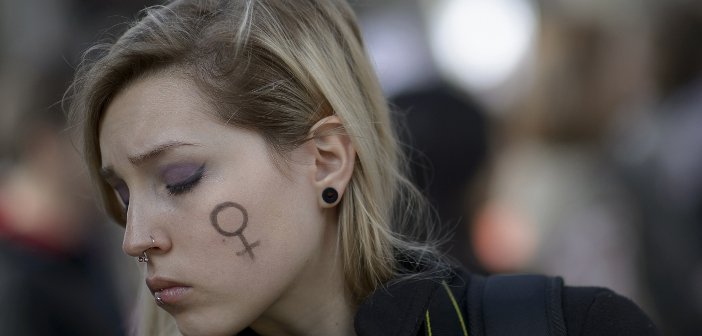Beyond the Stigma: Inside Spain’s “Abortion Society”
Last November, a pregnant, out of work, twenty-seven-year-old came to see me. Zoe (not her real name) had health issues that would make raising a child alone difficult, so her mother, social worker and therapist had recommended that she have an abortion.
We were in Spain – a country where abortion is available on demand up to fourteen weeks into a pregnancy – but Zoe wanted to keep her baby. “Women survive all sorts of difficult situations,” she said, wiping tears from her eyes. A mutual friend had asked me to spell out the challenges of single motherhood and encourage her to think about abortion. I’d promised to be emphatic, but listening to Zoe’s story reminded me how scary it is to be alone and pregnant. She had hearing problems, and she lip-read as I told her she could do whatever she wanted. She cried because I’d given her hope. While she left my house with a smile on her face, I felt sick. I knew nothing about being a single mother – I only knew about abortion.

Between 1992 and 2001, I’d travelled three times from Ireland to the UK for a termination. On a grey day in 1992, I’d taken a flight to Liverpool for my first abortion; seven years later I flew to a clinic in Birmingham with net curtains and a pebbled driveway. The Manchester clinic I travelled to for my third abortion was a pristine prefab with plastic plants. In 1992 the Irish government had passed a law permitting women to travel abroad for abortions and I was one of the lucky ones who could afford to go.[pullquote]While she left my house with a smile on her face, I felt sick. I knew nothing about being a single mother – I only knew about abortion.[/pullquote]
The new law spawned the expression “Irish abortion” – flying out of Ireland, usually to the UK, to have a termination at a foreign clinic. Spanish women faced the same restrictions until 1985, when abortion was made available in cases of rape or if there was a threat to the mother’s life, which could include risk of suicide. From 1985 to 2010 thousands of Spanish women were granted abortions on grounds of emotional stress. When Zapatero’s socialist government legalized abortion in 2010, Spanish women no longer had to lie about their reasons for wanting abortions and Spanish pro-lifers ramped up their activities.
A week before meeting Zoe, I’d come across the American pro-life organization Project Rachel, outside the clinic where I’d gone to seek out a post-abortion support group. I was disappointed to find none existed, but the presence of protesters with placards of aborted foetuses bewildered me. Inside the clinic, I saw their leaflets discarded in the bin. The nurse suggested I talk to them about a support group. When I approached the leader, she complained Zapatero’s law had turned Spain into an “abortion society.” Her speech was littered with violent jargon that threw me back to 1990s Ireland. I pointed out the number of Spanish abortions had fallen from 300,000 to 100,000 a year since 2010. I felt the sting of buried shame when she said only God could heal a woman after abortion.

In 2011, Project Rachel set up chapters across Spain. The branch in Cadiz operates as a family services centre providing accommodation and food to single mums, as well as post-abortion counselling. Curious, I’d taken the phone number from the protester and made an appointment to talk to a counsellor. Zoe visited me the night before my appointment, which added urgency to the meeting. Maribel, a matronly woman with frizzy hair, greeted me with an eager smile. We sat at a conference table in a large room with no décor bar a few dusty plants and a gold-framed Sacred Heart, which brought back memories of my convent school. Perhaps that’s why I was honest with her. When I got teary-eyed and said I couldn’t abandon Zoe, Maribel promised to help. I thanked her for her kindness, but it wasn’t long before gratitude shifted to regret.
Though it seemed misguided, I supported Zoe’s wish to keep her baby. As the days passed, her messages grew desperate. I can’t find work. My mother is scared. I am scared. I told her about Maribel’s offer and explained the organization found accommodation and did food collections for women like her. After Zoe agreed to meet with her, Maribel began sending four or five messages a day, asking again and again if Zoe had made a decision and was coming.
The meeting never happened. A few days later Zoe sent me a text saying she had decided to have an abortion. Her doctor had advised there was a chance she, the baby or both of them could die during pregnancy. “I never get the things I really want,” she wrote. I worried that, like me, Zoe would be scarred by her decision.
When Zoe visited me the following week, she looked better than I expected. Smiling, she bustled in my patio gate with her anorak hanging off her shoulder. We drank mint tea in the morning sun and she explained the doctor’s diagnosis in more detail. Instead of the scared girl I’d met before, this woman spoke confidently. After discussions with her family, friends and therapist, she felt supported and was adamant she’d made the right choice, even though she was sad to lose the baby. While I was happy for her, I was envious of the support group that had shared her burden. Unlike the secrecy and isolation I’d experienced in Ireland, Zoe’s support network didn’t treat her pregnancy as a mistake. They didn’t abandon her. Instead, they talked openly about her options and helped her make a decision. Was this the “abortion society” I’d been told about? If it was, I liked it.

When Zoe asked me if I’d go to the clinic with her, I said yes. On the day, I was glad Zoe’s mum came with us. At the clinic the three of us sat like schoolgirls in plastic chairs, Zoe in the middle. Other young women arrived, one with her mother, another with her partner. A bird-like girl who looked no more than fifteen sat opposite us next to her parents and boyfriend. Their neighbour was a middle-aged woman with beautiful red nails and a turkey neck. Her daughter was slender with low-slung track pants and a tattoo on her lower back; her boyfriend complained he couldn’t find anywhere to park.[pullquote]They didn’t abandon her. Instead, they talked openly about her options and helped her make a decision. Was this the “abortion society” I’d been told about? If it was, I liked it.[/pullquote]
The atmosphere in the waiting room wasn’t what I’d expected. Instead of shame, there was a sense of solidarity. But no one was fooling themselves – they knew why they were there. Hands were held. Mothers squeezed daughters’ arms. Partners looked sad. When the protesters showed up, the red-nailed woman complained: “Have they nothing better to do?” Busybodies, someone else said. Two hours after passing through the double doors, Zoe reappeared, flushed and dazed but still calm. Her mother jumped up and greeted her. I gave her a hug. We walked back to the car and Zoe said the pain wasn’t too bad.
When she came to visit me a few weeks later, Zoe was agitated and cried easily. She talked about the baby, how she’d given it a girl’s name and written a letter to her daughter, which she read to me. In it, she explained why the timing was wrong and said the baby would live in her heart forever; she apologized and asked for forgiveness. When she finished reading, she cried and we hugged. Her grief seemed so enormous, I was shocked by her optimism the next time we met, three weeks later.

Christmas had come and gone and she was in my patio again. She spoke about her plans: she wanted to start a business, to dance and create a piece of theatre. She said she couldn’t have done it without me: “Just knowing you were there really helped.” She had memorized the words of two songs, and in her tone-deaf voice, she sang me both. It took her ages to get going – she jumped up and down, washed her hands, moisturized them, took off her scarf and put on socks. When she was finally ready, she belted out those tunes as if she was Barbra Streisand. Rather than breaking her, having an abortion had given her a voice.[pullquote]When she was finally ready, she belted out those tunes as if she was Barbra Streisand. Rather than breaking her, having an abortion had given her a voice.[/pullquote]
Unlike Zoe, having an abortion had silenced me. Ireland has a known tradition of hiding and silencing its “fallen” women, and by migrating to Spain I followed that tradition – I silenced myself, hid my shame; never had kids. I look back now and think what a waste. What is an abortion society anyway? Is it one that discusses sex openly and accepts families don’t come in neat units? One that cares about the reproductive health of all its citizens and offers people in difficult circumstances a range of options? Or is it one that punishes its women for making “mistakes” by subjecting them to a life of poverty, exile or shame? Zoe showed me that when a woman is offered the right kind of support, no matter how awful her situation, she finds a way to sing.
